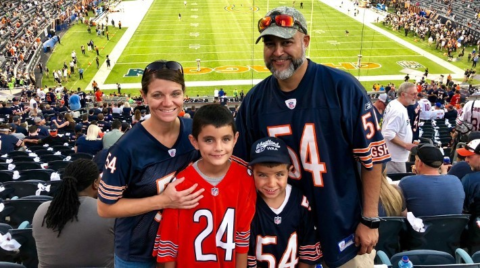Stomach Cancer Survivor Supports Other Young Adults With Cancer

Stomach cancer survivor Roy Arredondo says he’s learned a lot during the past 5 years about dealing with cancer as a young adult. Arredondo was 33 years old in 2012 and working in IT sales out of Chicago when he was diagnosed with stage 2 stomach cancer. He has a wife and 2 boys who were ages 4 and 1 at the time. “My life changed dramatically,” said Arredondo. “I was depressed, I was scared, I was angry, and I felt like a failure to my family.”
Cancer is not as common among young adults – those younger than age 40 – as it is among older adults. In fact, nearly 9 out of 10 cancers are diagnosed in people ages 50 and older. And when cancer is found in young adults, it’s often found at a later stage than in other age groups. One reason for this is the screening tests for most cancers usually aren’t recommended for young adults unless they have a higher than average risk for certain types of cancer. Another reason is because most young adults tend to be healthier and not go to the doctor unless they feel they really need to.
Routine screening for stomach cancer is not done in the US because it’s not that common. But Arredondo did go to the doctor when he noticed symptoms, including pain, fatigue, blood in his stool, and bloating. He says he just felt “off.” He also recognized that some of his symptoms were similar to ones his mother had before she was diagnosed with ovarian cancer. Even so, his cancer diagnosis was a shock. Arredondo says telling his parents was difficult, especially because they were still dealing with his mother’s cancer.
His treatment included surgery to remove 2/3 of his stomach, 5 months of chemotherapy, and 1 month of radiation. Arredondo finished treatment in June 2013 and doctors found no more evidence of cancer. Despite this news, he began to struggle with depression. “During that year I had survivor’s guilt and fear of recurrence,” said Arredondo. “I was scared I wasn’t going to see my 2 young boys get past grade school. It was difficult coming home from work every day when I didn’t know how to handle my emotions. I bottled it up and hoped it would just go away.”
About 6 weeks after his treatment ended, things started to look up again. Arredondo ran his first 10K mud obstacle course. Since then, he’s participated in about 2 or 3 of them every year, helping to raise money for nonprofits that support young adult cancer survivors. He says he tackles the physical challenge to prove to himself that he’s staying healthy, and also to remind himself of what he’s gone through.
During that first year after treatment, Arredondo and his wife continued to look for ways to help lift him out of his depression. Along with their family, they formed a team and participated in their local American Cancer Society Relay For Life event in Naperville, Illinois. Relay For Life events are held every year in communities around the world, raising money to invest in research and to provide information and services to cancer patients and caregivers. “Meeting other young adult cancer survivors and experiencing the camaraderie, knowing you’re not alone – that makes a big difference,” said Arredondo. His family has now made Relay For Life an annual tradition.
It was during a week-long backpacking and canoeing trip to Utah with a nonprofit organization for teens and young adults with cancer that Arredondo says he found himself again. “Going out in the wilderness, climbing canyon walls, and seeing the view from the top lets you see how small you are in the grand scheme of things. It helped me let go of my anxiety,” said Arredondo. “I met amazing survivors and learned how to deal with life after cancer. I came back a new man. I’ve been working with them since to help other young adults like me who are battling cancer.”
Recurrence
Last May, Arredondo started having severe abdominal pain and difficulty eating. He was saddened to learn his cancer had returned. He’s back in treatment, which will include chemotherapy and surgery.
“As you can imagine, we were caught off guard again with the diagnosis. The anger and sadness came on quickly,” said Arredondo. “Fortunately, I learned a lot from my fellow survivors over the last 5 years,” said Arredondo. “I use mindful meditation and a social media blog to remind others and myself that it isn’t the end of the world. I can beat this again.”
Arredondo says the lessons he learned have made his experience more positive this time around. He’s being a lot more vocal, especially on social media, to let others know how things are going and what he needs. He says he and his family are more prone to say “yes” to offers of help, including meal trains, gift cards for eating out, and offers to help with chores around the house. One of his posts even attracted the attention of former Chicago Bears football player Brian Urlacher, who treated Arredondo and his whole family to a game.
“Every day I try to find the positivity in people, friends and family,” said Arredondo. “I have my up days and I have my down days. All I try to do is stay positive, stay engaged with work, create memories with my family and more importantly remind myself that being positive and trusting in my oncology team that this will all work itself out again.”
_______________________________________
How can you help?
Support the Coaches Vs. Cancer Auction at the BCA March Madness Event on Thursday, March 21st. 100% of the proceeds will directly benefit the Philadelphia chapter of Coaches Vs. Cancer.
Can’t Attend? No Problem!
____________________________________________________________________
The BCA March Madness Event powered by Gibbons P.C. is a private event for BCA members and their invited guests, attendance is by invite only. No walk-ups will be permitted at the door. Every attendee must have a ticket registered in our system to receive entry.
